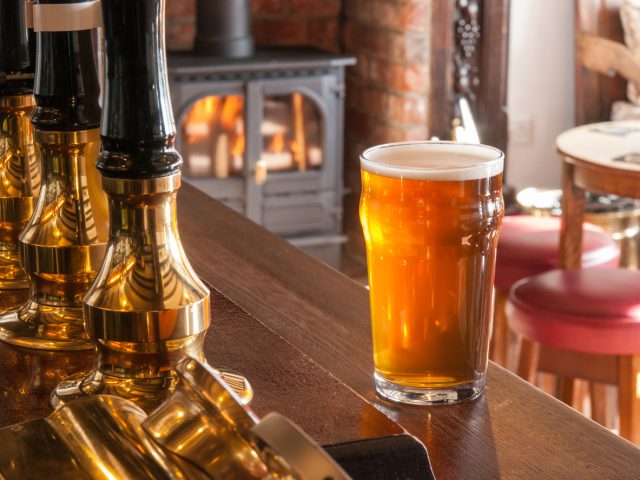Fresh Ale will be ‘supplementing, not supplanting’ cask says CMBC
Carlsberg Marston’s Brewing Company (CMBC) has insisted its ‘Fresh Ale’ won’t replace cask, but will help by “reinvigorating the category”.

The response follows CAMRA revealing it had shopped CMBC for potentially breaching consumer protection legislation and called for investigations into whether the Consumer Protection from Unfair Trading Regulations had been compromised.
This week, CAMRA wrote to National Trading Standards and Trading Standards Scotland asking for an investigation into CMBC’s ‘Fresh Ale’ products, which use a cask handpump to serve the beer, which is kegged rather than cask conditioned. CAMRA then launched a ‘Handpump Hijack’ campaign in a bid to raise awareness of misleading beer dispense, and make sure that the handpump remains a signifier of cask-conditioned beer.
The moves by CAMRA follow the new beer category ‘Fresh Ale’ being launched last year by Otter Brewery in an attempt to traverse the cask ale, lager and craft beer categories to appeal to a broader range of drinkers. To explain more about how it differed from cask, db did a deeper dive into the concept in a follow up report on its creation.
What followed was CMBC then launching its own ‘Fresh Ale’ to begin “reinvigorating” Britain’s beer and pub culture. A decision that was welcomed by Otter Brewery, which then asked AB InBev and Heineken to join the category too. CAMRA, however, has remained stoic about the developments, while the BBPA has backed the ‘Fresh Ale’ concept as a good move for pubs.
Gillian Hough, national director and chair of CAMRA’s real ale, cider and perry campaigns committee, said: “CAMRA believes that these practices come under the scope of the Consumer Protection from Unfair Trading Regulations 2008, as the average consumer may choose to buy the product on the basis that they believe it to be cask conditioned beer, which in this case it is not. We believe that this falls foul of the Order’s provisions in Section 2 to protect consumers from presentation which is likely to deceive the average consumer or cause the average consumers to take a transactional decision he would not have taken otherwise.”
Responding to CAMRA’s complaint, CMBC reiterated that it is a business with a big interest in cask ale and yet is “strongly committed to reinvigorating the category” and insisted that “‘Fresh Ale’ is a critical element of this”.
Speaking to the drinks business, the CMBC spokesperson said: “CMBC is incredibly proud to be a leading brewer of cask ale, which is a key part of the UK’s brewing heritage. The market has been significantly impacted in recent years, both by the decline in the on-trade, and by changing consumer preferences, with Covid further exacerbating the issue. Over the past four years, cask has declined by 31%, but we are strongly committed to reinvigorating the category and supporting it to succeed for many generations to come.”
Partner Content
The spokesperson explained: “Our brewery conditioned ‘Fresh Ale’ is a critical element of this – supplementing, not supplanting, traditional cask ale. It has been developed to make offering a wide range of great-tasting ales more accessible for publicans who either aren’t able to offer cask at all, or who don’t have sufficient throughput to have more than one or two cask options on the bar, but who want to offer consumers a greater choice of ales. Our primary aim is to safeguard the future of ale and the pub culture it embodies.”
CAMRA national chairman Nik Antona said: “Misleading dispense is particularly detrimental to beer drinkers, as hijacking a handpump to serve a keg beer removes a genuine cask product from the bar, reducing choice of different formats for consumers.”
Antona went on to point out that CMBC has “a track record on potentially misleading marketing” and used the example of it “having already badged Wainwright as ‘A Lake District Original’, despite it being brewed over 100 miles away in Wolverhampton”.
Antona said that CAMRA remains territorial of the handpump as a bastion of cask ale and hopes “that Trading Standards bodies across Great Britain will take swiftly coordinated national action to address misleading beer dispense and safeguard the handpump as an indicator of cask beer”.
One view between CAMRA and CMBC does align on the matter of cask, however, that it will be crucial to signpost the difference between cask ale and ‘Fresh Ale’ at the bar so that consumers feel more informed about what they are buying. Despite this, CMBC still intends to use the handpump, just with clear communication.
The CMBC spokesperson told db: “We agree it is important to make the distinction between brewery conditioned ale and cask conditioned ale, and for that reason, we are clearly signposting the difference, at point of purchase, with a pump clip attachment, which states ‘Brewery Conditioned for Freshness’ and includes a QR code leading consumers to a microsite, to learn more about ‘Fresh Ale’.”
The CMBC spokesperson added that it was open to conversing with CAMRA over how ‘Fresh Ale’ can help cask sales. Indeed, as the spokesperson added, CMBC would “welcome the opportunity to engage with CAMRA in a constructive discussion on how industry innovation can help us all collectively deliver a sustainable future for ale in the UK”.
Related news
The Castel Group rocked by Succession-style family rift
Carlsberg boosts presence in China with restaurant guide tie-up




